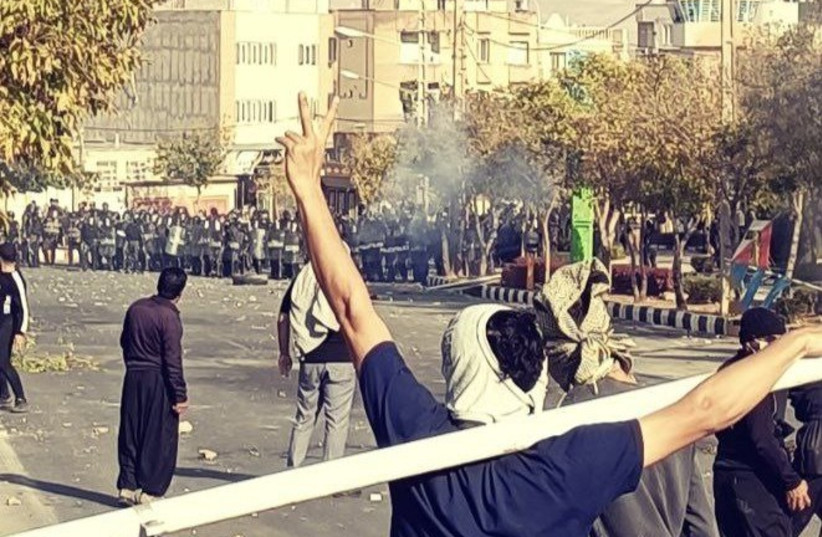Iranian rapper Toomaj Salehi - who was arrested during the Woman, Life, Freedom protests that swept Iran in 2022 - was sentenced to death, Salehi's lawyer, Amir Raesian, told the Shargh newspaper on Wednesday.
Salehi was prosecuted on charges of corruption on earth, a charge used often by the regime in Iran to target activists.
The rapper was arrested in October 2022 amid nationwide protests against the regime. At the time, the Iranian Fars News Agency referred to Salehi as "one of the leaders of the riots." Fars claimed that Salehi was trying to flee the country when he was arrested.
He was sentenced in July to six years and three months in prison but was released on bail after the Iranian Supreme Court found "flaws" in the original sentence. He was then rearrested in December after publishing a video saying he was tortured while detained.

Raesian stated that there were several "inconsistencies" in the new verdict and that he intends to file an appeal. He added that the court in Isfahan that sentenced Salehi referred to the Supreme Court's decision as "advice."
In October, Salegi received the 2023 Freedom of Expression Arts Award from the Index on Censorship organization.
Ye-One Rhie, a member of the German Bundestag, condemned the sentence on Wednesday, writing on X "The level of the sentence is absurd and inhumane. This sentence has no basis in the rule of law and is therefore completely unacceptable."
"It is still completely unclear how this verdict came about. It is unbelievable how irresponsibly and arbitrarily the Iranian regime treats defendants. It is impossible to recognize the rule of law in the chaos of the courts in charge," said Rhie, calling for the immediate release of Salehi.
Helmut Brandstätter, a member of the Austrian National Council who has sponsored Salehi, expressed outrage at the decision, noting that he will continue to push for the Islamic Revolutionary Guard Corps to be placed on the terrorism list and for Foreign Minister Schallenberg to protest the sentence to Iran's ambassador in Austria. Brandstätter called for people around the world to show support for Salehi and other political prisoners.
The Center for Human Rights in Iran condemned the sentencing as well, stressing that it "underscores the glaring unlawfulness and injustice of the Islamic Republic’s judicial system, which has been weaponized and used as a tool by the state security forces to crush dissent and perpetuate political repression."
"Not only was Toomaj imprisoned for participating in a peaceful protest, but now a lower court, acting as a willful instrument of the state’s security apparatus, has unlawfully sentenced him to death, disregarding the supreme court’s decision to overturn the initial verdict of a prison sentence,” said the Center's Executive Director Hadi Ghaemi.
“This grotesque manipulation of the judicial process aims to silence dissent,” added Ghaemi. “Toomaj’s imprisonment stems from his vocal advocacy against state oppression. It is imperative that supporters of free speech and dissent unite to demand his immediate release.”
Kurdish rapper sentenced to exile earlier this week
The regime in Iran has targeted several singers and artists who supported or took part in the protests in 2022.
Salehi's death sentence comes just a few days after Saman Yasin, a Kurdish rapper who was arrested during the Woman, Life, Freedom protests in 2022, was sentenced to five years of "exile" in the city of Kerman. Yasin had originally been sentenced to death, but Iran's Supreme Court overturned the ruling, according to Yasin's lawyer.
The punishment of exile involves sending a person to an isolated location where they must remain and periodically report to local authorities. The locations are usually impoverished and subject to an intensive presence of security forces.
In March, Shervin Hajipour, the Iranian singer whose song Baraye (“For”) became an anthem of the "Women, Life, Liberty" protests in 2022, was sentenced to three years and eight months in prison and ordered to write a song against the US.
In February of last year, Hajipour won the Special Merit Award for Best Song For Social Change for his song Baraye at the GRAMMYs.
Islamic regime intensifies assault on women in Iran
The sentencing also comes as the Islamic regime in Iran has begun intensifying its crackdown on hijab restrictions in several cities in the past few weeks, with violent arrests reported across the country by opposition groups and human rights agencies.
The intensified assault on women across Iran comes after the regime announced the "Nour Project." The project, aimed at "dealing with anomalies," has involved a heavy presence of the "Morality Police" in several cities since this past weekend.
Narges Mohammadi, an Iranian human rights activist and Nobel Peace Prize laureate, warned that the Islamic regime in Iran was waging an "all-out war" against Iranian women in a voice recording that she managed to send from within Tehran's Evin Prison on Sunday.
The Islamic regime in Iran has been gradually intensifying enforcement of hijab laws since they were somewhat relaxed in light of nationwide protests that swept Iran after Mahsa Amini, a Kurdish-Iranian woman, was killed by "Morality Police" in Tehran.
Amini’s death sparked intense nationwide demonstrations last September, commonly referred to as the “Woman, Life, Liberty” (“Jin, Jiyan, Azadî” in Kurdish) protests, which continued in full strength for months on end.
